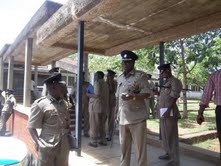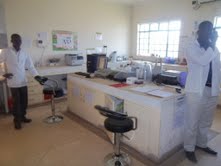By Tom Alila
The people of Kenya have followed the recent engagement between Deputy Prime Minister Uhuru Kenyatta and an amorphous group that calls itself the Luo Nyanza professional and business caucus with much interest. Whereas inter-communal engagements are to be encouraged and should be the norm, this particular engagement in my view marks a new low point in the political development of this nation.
First of all it was a tacit admission on the part of the finance minister that there has been a deliberate effort to discriminate, stigmatize and exclude certain regions and communities in this country from enjoying the fruits of development. This was the “siasa mbaya maisha mbaya” developmental model bequeathed to the nation by the Kenyatta and Moi regimes. The finance minister, who is the crown prince of the old order, appears hell-bent on sustaining this anachronism. A cursory glance at the profile of staff and holders of plum positions in some of the key institutions under his docket, say KRA, Treasury and Central Bank will reveal he presides over the worst cases of tribal hegemony in public institutions in the whole country.
Indeed it is precisely in response to the exclusive, whimsical, personalized and tribalised abuse of political power by the executive to reward and punish communities, groups and regions that Kenyans decided to vote for a new constitutional order that would bury the ghost of “siasa mbaya maisha mbaya” once and for all. The new constitution lays out the principles and institutions that will guide the hitherto manipulated allocation of resources and economic investments. The thinking behind this was that no group or region would ever again be held hostage to the whims of individuals in seeking their rightful share of national resources and the needed investments in economic and physical infrastructure.
Secondly, engaging with anything with the prefix Luo, including political charlatans, would appear to be a belated attempt at fashioning some “nationalist” credentials for the finance minister. Kenyans view this feeble effort against a backdrop of his intolerant and chauvinistic rhetoric, as we have interacted with in the last few months. But such is the incredulity and poverty of thought in some of our leaders that they would want us believe they have undergone some metamorphosis overnight and embraced those who were the objects of their passionate hate only the other day. This is not say that it is an impossibility for a change of heart to take place. Did not Saul, that famous persecutor of Christians, become the famous Paul who is credited with the highest number of chapters in the bible? Such a change would be most welcome, but more objective indicators would be needed to demonstrate this. A good point to start would be to de-tribalise the financial sector, not for the sake of Luos only, but for the sake of all Kenyans.
Kenyans remember that here is a man who inherited a powerful and national KANU political benemoth, with more than 130 MPs from all provinces in 2002, bequeathed him by president Moi. He had squandered this massive political capital in a record five years. By the time he re-joined parliament in 2003, he had just over 60 MPs, losing more than half the MPs he inherited. By January 2008, he had only 10 MPs, and he had betrayed his partisan inclinations when he abandoned a national KANU party, and rode the dysfunctional GEMA tiger otherwise known as PNU. In the process he gained global infamy as the only official leader of the opposition not to contest national leadership against an incumbent. Lately, we understand that women are excluded ab initio from his politburo of GEMA “elders”, yet again betraying a deeply chauvinistic bent to his persona. The politics and development of exclusion seem therefore to come so naturally to him. Impatient with functional political institutions and the rule of law and constitutionalism, he continues to toy with some loose amalgam of political opportunists named G7 (7 provinces except Nyanza), whose sole raison d’etre is apparently to leave out the so called Luo-Nyanza from the national political and developmental calculus.
Most of the country’s business is done with our regional neighbours, and Kisumu has long merited to be developed into a regional transport and industrial/business hub, given its strategic location. This has not been prioritized. Instead what we have witnessed is the frenzied development of a 10-lane Nairobi-Thika superhighway that is not even the country’s economic artery…this distinction belongs to the Mombasa-Kisumu-Busia/Malaba highway. Similarly, the world’s second largest lake has no hotel comparable to hotels in the Ugandan and Tanzanian side of the lake. Instead, what would be considered as ponds by comparison, such as lakes Naivasha, Elementaita and Nakuru, host a plethora of world-class tourist hotels. The sugar/cotton sectors that do well in Nyanza/western provinces and irrigation schemes in this part of Kenya do not enjoy the clout and policy/financial support that is accorded say dairy, tea, maize, and coffee.
It may yet be asked therefore: What inclusive agenda for Kenyans has Uhuru ever pushed? It should be re-stated for the benefit of Uhuru and his ilk, that Nyanza (whether Luo or Kisii/Kuria), Central, Rift valley, North-eastern, Western, coast, eastern and Nairobi all deserve resources from the government. There is no need to resort to developmental blackmail and the principle of luo-exceptionalism.
The writer is KANU Chairman Ndhiwa





